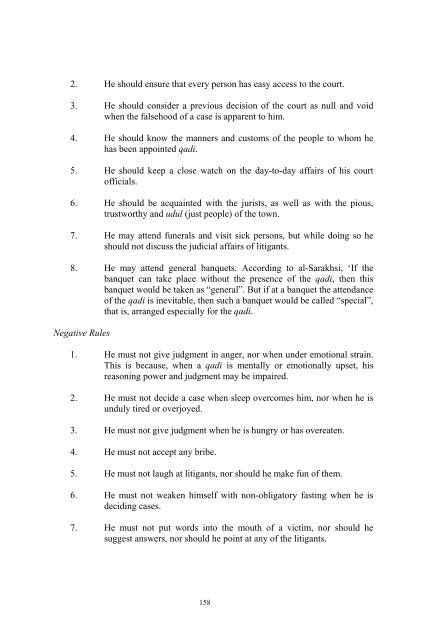- Page 2 and 3:
United NationsOffice on Drugs and C
- Page 4:
CONTENTSPreface… ................
- Page 10 and 11:
DRAFTING HISTORYI. BackgroundIn Apr
- Page 12 and 13:
g. The Iowa Code of Judicial Conduc
- Page 14 and 15:
IV. The Bangalore Draft Code of Jud
- Page 16 and 17:
Davide of the Supreme Court of the
- Page 18 and 19:
The Commission has frequently expre
- Page 20 and 21:
(h) Requested the UNODC to convene
- Page 22:
Where citations have been used, the
- Page 25 and 26:
WHEREAS the International Covenant
- Page 27 and 28:
WHEREAS the foregoing fundamental p
- Page 29 and 30:
esponsibility, it is essential that
- Page 31 and 32:
WHEREAS it is essential that judges
- Page 33 and 34:
WHEREAS the primary responsibility
- Page 35 and 36:
5. Everyone shall have the right to
- Page 37 and 38:
THE FOLLOWING PRINCIPLES are intend
- Page 40 and 41:
Value 1INDEPENDENCEPrinciple:Judici
- Page 42 and 43:
Conditions for judicial independenc
- Page 44 and 45:
A judge must act irrespective of po
- Page 46 and 47:
finding, an important part of a jud
- Page 48 and 49:
1.3 A judge shall not only be free
- Page 50 and 51:
or her. No such gatherings should b
- Page 52 and 53:
that very remote instance the judge
- Page 54 and 55:
1.6 A judge shall exhibit and promo
- Page 56 and 57:
(d)(e)(f)(g)(h)(i)(j)(k)(l)(m)(n)(o
- Page 58 and 59:
Value 2IMPARTIALITYPrinciple:Impart
- Page 60 and 61:
Application:2.1 A judge shall perfo
- Page 62 and 63:
2.2 A judge shall ensure that his o
- Page 64 and 65:
2.3 A judge shall, so far as is rea
- Page 66 and 67:
2.4 A judge shall not knowingly, wh
- Page 68 and 69:
(b) The second aspect relates to a
- Page 70 and 71:
informed, will remove the objection
- Page 72 and 73:
countenances the possibility that j
- Page 74 and 75:
Other things being equal, the more
- Page 76 and 77:
2.5.2 the judge previously served a
- Page 78:
Provided that disqualification of a
- Page 81 and 82:
Application3.1 A judge shall ensure
- Page 83 and 84:
It has been argued that the use of
- Page 86 and 87:
Value 4PROPRIETYPrinciple:Propriety
- Page 88 and 89:
4.2. As a subject of constant publi
- Page 90 and 91:
4.3 A judge shall, in his or her pe
- Page 92 and 93:
Special care should be taken where
- Page 94 and 95:
not hold a supervisory or administr
- Page 96 and 97:
4.6 A judge, like any other citizen
- Page 98 and 99:
such judicial commentary should be
- Page 100 and 101:
4.8 A judge shall not allow the jud
- Page 102 and 103:
performance of their lawful duties
- Page 104 and 105:
Former judges153. Depending on loca
- Page 106 and 107:
4.11 Subject to the proper performa
- Page 108 and 109: 4.11.3 serve as a member of an offi
- Page 110 and 111: ii. Does it essentially involve an
- Page 112 and 113: 4.11.4 engage in other activities i
- Page 114 and 115: should not give legal advice. This
- Page 116 and 117: Protecting the judge’s own intere
- Page 118 and 119: 4.14 A judge and members of the jud
- Page 120 and 121: 4.16 Subject to law and to any lega
- Page 122 and 123: Value 5EQUALITYPrinciple:Ensuring e
- Page 124 and 125: Application5.1 A judge shall be awa
- Page 126 and 127: 5.3 A judge shall carry out judicia
- Page 128 and 129: 5.5 A judge shall require lawyers i
- Page 130 and 131: Value 6COMPETENCE AND DILIGENCEPrin
- Page 132 and 133: Application6.1 The judicial duties
- Page 134 and 135: judgment, the expedition of cases,
- Page 136 and 137: The quality of judgment and demeano
- Page 138 and 139: 6.4 A judge shall keep himself or h
- Page 140 and 141: about decisions that appear to them
- Page 142 and 143: impossible, to suggest a uniform st
- Page 144 and 145: IMPLEMENTATIONBy reason of the natu
- Page 146 and 147: DEFINITIONSIn this statement of pri
- Page 148 and 149: AnnexCULTURAL AND RELIGIOUS TRADITI
- Page 150 and 151: When a judge does not inquire into
- Page 152 and 153: . . . deal impartially with the sui
- Page 154 and 155: Jewish LawThe following is an extra
- Page 156 and 157: Sanity: A person whose judgment is
- Page 160 and 161: 8. He must not permit a litigant to
- Page 162 and 163: SELECT BIBLIOGRAPHYBooks and Monogr
- Page 164 and 165: Delaware Judicial Ethics Advisory C
- Page 166 and 167: INDEX 80accused personrights, 49app
- Page 168 and 169: prompt disposal of matters, 207rese
- Page 170 and 171: apprehension of bias, 56abuse of co
- Page 172 and 173: family members, activities of, 69fo
- Page 174 and 175: personal knowledge of disputed fact
- Page 176: sentencing, rights relating to, 50s


